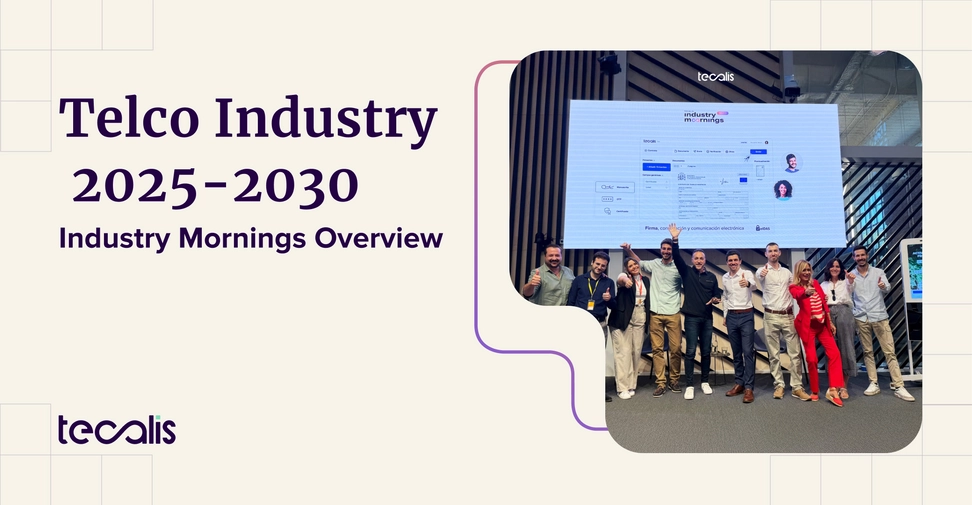Index
Get the latest news right in your inbox
Telco Industry Outlook 2025-2030: Industry Mornings Overview
The telecommunications sector is at a historic crossroads. Acting as the true circulatory system of the digital economy, telcos are the foundation on which teleworking, streaming, autonomous cars, and the entire connected future that is already here are built. In this context of rapid change, innovation is not an option, it is an obligation.
To analyze the challenges and, above all, the immense opportunities that are emerging, Tecalis and Google held the first Tecalis Industry Mornings: Telco Brunch. The event became a high-level forum where industry leaders, experts, and visionaries discussed the keys to an inevitable transformation marked by artificial intelligence, the redefinition of the customer experience, and intelligent automation.
In this article, we summarize the ideas, figures, strategies, and technologies discussed at the event, forming a roadmap for the immediate future of the sector.
What is Happening And What Will Happen in the Telco Industry?
The opening session, led by Isidoro Martínez, CEO and Co-Founder of Tecalis, began with a precise analysis of the present and future of the sector. Far from being a stagnant industry, telecommunications is a vibrant ecosystem with massive investment capacity and economic impact. The figures speak for themselves and help us to gauge the playing field.
Figures and Current Events in the Telecommunications Sector
The dynamism of the industry is reflected in compelling data that demonstrates its resilience and commitment to innovation:
- €35 billion in revenue in Spain, consolidating its weight in the national economy.
- €1 trillion in revenue at the European level, demonstrating its continental reach.
- 60% investment by operators in the modernization of infrastructure and services.
- 95% of households already have access to fiber optics, one of the most advanced networks in the world.
- 82% of the population has 5G coverage, laying the foundations for the new generation of connected services.
However, this landscape faces major challenges: fierce competitive pressure, increasingly demanding customers who want immediacy and personalization, and a clear trend toward market concentration.
In this scenario, technology emerges as the key lever for differentiation. Isidoro highlights two trends that are no longer the future, but a tangible present:
- Artificial Intelligence: AI is the central theme that runs through all telco operations, especially in customer service. Its application enables real hyper-personalization, designing commercial offers tailored to each individual thanks to intelligent data analysis. It also facilitates unprecedented proactivity, anticipating incidents and solving problems before the customer perceives them.
- Secure Digital Contracting: The way customers sign up is changing radically. The imminent mandatory implementation of regulations such as eIDAS 2.0 starting next year requires 100% digital, secure, and frictionless onboarding processes. We are talking about sign-ups via a simple QR code, without the need to present physical documentation. Solutions such as Tecalis Identity already integrate these flows natively, ensuring regulatory compliance and an exceptional user experience.
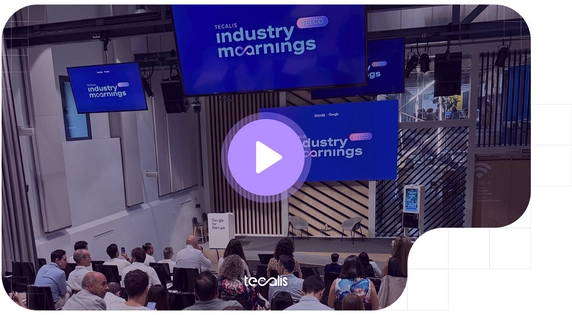
Telco Workshop: Best Practices, Challenges, and AI for the Telco Sector
Following the strategic vision, Alberto Campos, our Chief Operations Officer, delves into the "how," presenting a technical workshop focused on resolving friction points in the contracting cycle and sales management.
The premise is clear: technology must simplify complexity. In a traditional face-to-face sales process, the problems are obvious: manual data entry, risk of document fraud, and slow processes. Tecalis' proposal subverts this paradigm:
- Data Capture Via QR or NFC: The process starts with the scanning of a code that represents the sale, securely transferring the transaction to the customer's mobile phone. This not only speeds up the process, but also ensures that the customer is physically in the store, mitigating fraud.
- Identity Verification (KYC): From their mobile phone, the customer initiates a verification process where our technology validates that the identity document is real and belongs to the person presenting it, using active and passive proof of life.
- Scoring and Electronic Signature: With the data verified, processes such as bank scraping can be executed to obtain a real-time risk score. The cycle culminates with an electronic signature (simple or advanced, depending on the case) that generates an Audit Trail, an unalterable audit document that collects all the digital evidence of the process, guaranteeing maximum legal security.
Customer Hub: The Ecosystem for Comprehensive Seller Management
The complexity lies not only in the sale, but also in the management of the channels. The centerpiece of this is Customer Hub, an ecosystem of solutions that unifies product sales on a single platform. It allows silent integrations with organizations such as the Spanish Tax Agency (AEAT) and Social Security to validate a customer's solvency in real time, and can even be integrated as a widget on a wholesaler's website, adapting to its look and feel to automate sales.
AutoSIM and DxBot: The Unattended Registration Revolution
One of the most disruptive products presented is AutoSIM, a Plug & Play solution that allows marketing departments to launch telco products without the need for complex integrations with core systems. Its magic lies in DxBot, a robot that, when scanning a QR code, connects to the telco's systems to check the rates available in real time and present them to the customer. While the customer completes the KYC process on their mobile phone, the robot uses that information to complete the registration in the company's systems, issuing an activated e-SIM in a matter of seconds.
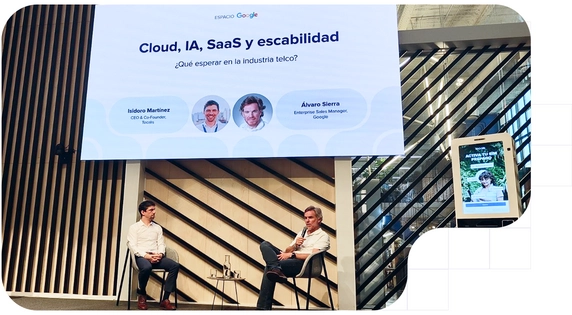
AI and "Customer Hub Copilot": Empowering the Human Agent
AI is the next level in the evolution of Customer Hub. Alberto Campos introduces us to the concept of "Customer Hub Copilot," an advanced conversational agent designed not to replace the salesperson, but to empower them.
This copilot, based on Google's LLMs, is founded on three technical pillars:
- Retrieval-Augmented Generation (RAG): The agent connects in real time to internal knowledge bases (manuals, offers, tutorials), allowing the salesperson to instantly resolve complex queries, such as: "What are the differences between rates X and Z for a customer with this score?"
- Tool Calling: The agent can interact with external systems. An after-sales agent can ask in natural language:
"Show me a summary of the customer, the last three invoices, and open incidents," and Copilot will consult the CRM, ERP, and ticketing system via API to return a consolidated response. - Feedback and Self-Improvement Cycle: When an incident is resolved by a human technician, that validated solution is fed back into the vector knowledge base. Thus, the next time Copilot encounters a similar problem, it will already know the correct answer, creating a system that continuously learns and improves.
Cloud, AI, Agents, and SaaS: What to Expect in the Telco Industry?
The conversation between Isidoro Martínez and Álvaro Sierra, VP Telco at Google, elevates the debate to the major strategic trends that are redefining the telco business model.
The mantra is clear: operators want to "do more with less," and to do so, AI is the key to integrating their vast data silos (CRM, network data, third-party data) and turning them into actionable intelligence. The goal is twofold:
- Generate New Business: Identify behavior patterns to proactively offer cross-selling and upselling opportunities with products that fit the customer and their needs.
- Reduce Churn: AI can detect subtle changes in a customer's consumption patterns that indicate a possible switch to a competitor, allowing the telco to act before it's too late. Álvaro's example: if a micro network outage interrupts an important soccer game involving the club I support, a proactive notification apologizing and offering a small bonus can dramatically reduce the likelihood that I, as a customer, will switch
From Chatbots to AI Agents: the Era of Proactivity
One of the most important distinctions to keep in mind is between chatbots and AI agents.
- A chatbot is, in essence, a reactive system that responds to predefined inputs with predesigned messages and responses to follow a series of steps that guide the customer in a simple way to the resolution of their problem, or at least take them to the right place to achieve it.
- An AI agent is proactive, has reasoning capabilities, and can perform complex actions by interacting with other company systems, such as autonomously registering or canceling a service. It can understand customer messages to provide a comprehensive and reasoned response to give them a solution on the spot, or offer alternatives that better suit their needs.
This ability is essential for building a truly unified omnichannel experience in a polished customer journey. The worst customer experience is having to repeat your problem every time you change channels (from the phone to the physical store, for example). Having an AI agent that centralizes the context ensures that every interaction is smooth and consistent, regardless of the channel.
The future of call centers is hybrid: AI agents will handle transactional tasks, while human agents will provide empathy and resolve complex problems where the relational factor is key.
Telco Technology in Action
From concept to reality. Javier Novoa, our Head of Product Marketing, and Raúl Louzao, Head of Sign & e-Invoicing, take the stage to demonstrate how all this technology works in practice.
Javier shows us a SIM self-activation flow (AutoSIM) from start to finish, highlighting how Tecalis technology eliminates friction: KYC with proof of life is performed in seconds and ID card data is used to automatically fill in the form fields, preventing the customer from having to repeatedly type in their information.
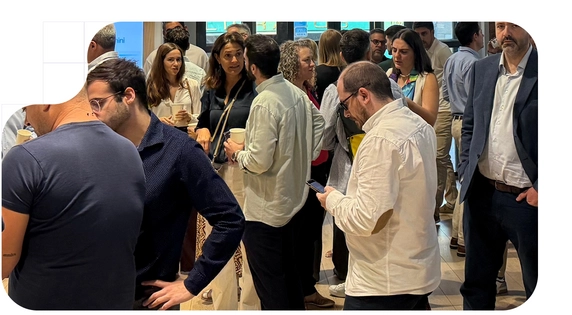
The B2B Opportunity: Electronic Signature and Invoicing
Raúl Louzao focuses on the B2B segment, a huge opportunity for telcos. With electronic invoicing becoming mandatory under laws such as "Crea y crece" in Spain, operators are in a unique position to bundle this service with electronic signatures and their connectivity offerings. The value is threefold:
- Increased ARPU (average revenue per user).
- Differentiation, providing value that goes beyond connectivity.
- Retention, since changing billing providers is much more complex than changing mobile lines, ensuring long-term customer loyalty.
Tecalis Kiosks: The Self-Service Revolution
The highlight of the demos comes with the live presentation of the Tecalis self-service kiosk. What does a customer experience at the kiosk during the entire process of purchasing a SIM card?
- The user selects the rate on the touch screen.
- The kiosk uses its built-in scanner to perform a complete KYC process, asking the user to insert their ID card.
- A camera performs a liveness check to ensure that the person is who they say they are.
- After reviewing and signing the contract on screen, payment is made and the kiosk instantly issues the activated SIM card.
This entire network of terminals is managed from Tecalis Kiosk Cloud, a platform that allows real-time monitoring of the status of each kiosk, its sales, its consumable levels (paper, SIM cards), and even remote configuration of its components, such as turning on the internal light or fan if a rise in terminal temperature is detected.
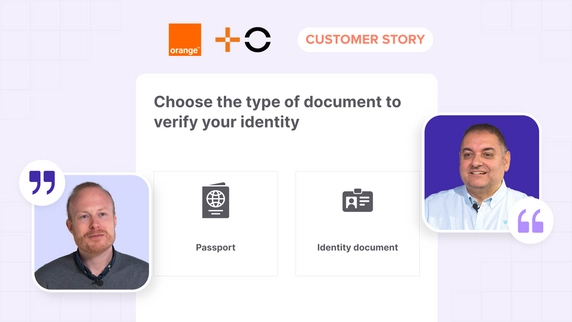
Are AI and Kiosks Going to Work on Our Behalf?
Isidoro Martínez returns to close with a provocative question that everyone has asked themselves at some point in recent years: "Are AI and kiosks going to replace us?" The answer, from Tecalis' point of view, is a resounding NO. "They are not going to work for us, they are going to work WITH us."
AI and automation are not substitutes for human talent; they are support tools that will allow us to perform better, be more efficient, and focus on tasks with greater added value. The figures that closed the event reinforce this vision: 47% of AI uses in telcos are already aimed at improving customer service, and the self-service kiosk market will exceed $45 billion by 2028.
To round off the event, we announced the new generation of terminals, the Tecalis Kiosk T0X for 2026, which will integrate advanced hardware, AI for behavior analysis, native 5G connectivity, and a sustainable design.
Tecalis x Google Industry Mornings: Telco Brunch has shown us that the future of the telco sector is already under construction. A smarter, more agile, and customer-centric future.
















